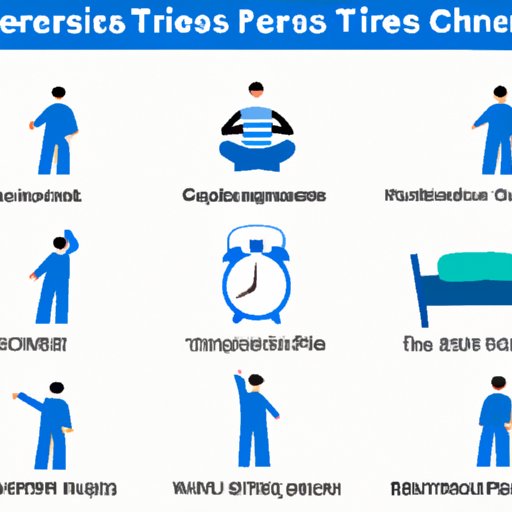Introduction
Chronic stress is a long-term response to stressful situations that can have a serious negative impact on physical and mental health. It is important to learn how to manage chronic stress in order to reduce its effects and prevent further damage to your wellbeing. In this article, we will explore how to manage chronic stress through developing healthy coping strategies, exercising regularly, getting enough sleep, practicing mindfulness, and connecting with friends and family.
Develop Healthy Coping Strategies
The first step in managing chronic stress is to identify triggers and warning signs of stress in order to develop healthy coping strategies. Triggers are particular events or situations that may lead to increased stress levels, while warning signs are the physical and emotional symptoms that you experience when you become stressed. Common triggers of stress include work deadlines, financial issues, relationship problems, and health concerns, while common warning signs include difficulty sleeping, headaches, irritability, and fatigue.
Once you have identified your triggers and warning signs, it is important to find healthy ways to cope with stress. This can include activities such as relaxation techniques, mindfulness meditation, journaling, and talking to a friend or family member about your feelings. These activities can help you to process your emotions and view the situation from a different perspective, enabling you to find more effective solutions.
Exercise Regularly
Regular exercise can be an effective way to manage chronic stress. Exercise releases endorphins, which are hormones that act as natural painkillers and improve mood. It also increases energy levels and reduces feelings of depression and anxiety. A regular exercise routine can help to reduce stress levels and increase overall wellbeing.
Getting started with an exercise routine can be daunting, but there are many simple ways to incorporate physical activity into your daily life. Taking a walk or bike ride outdoors, joining an online fitness class, or doing yoga at home are all great options. It is important to find an activity that you enjoy and that fits into your lifestyle, so that you can stick with it in the long term.
Get Enough Sleep
Sleep plays an important role in managing chronic stress. Sleep deprivation can have a significant impact on stress levels, as it reduces the body’s ability to cope with difficult situations. Studies have shown that people who get less than 7 hours of sleep per night are more likely to suffer from anxiety and depression.
Improving your sleep quality can help to reduce stress levels. Establishing a regular sleep schedule, avoiding caffeine and alcohol close to bedtime, and limiting screen time before bed can all help to improve your sleep quality. Additionally, using relaxation techniques such as guided meditation or deep breathing can help to relax the mind and body, making it easier to fall asleep.
Practice Mindfulness
Mindfulness is the practice of being present and aware of your thoughts, feelings, and surroundings. Practicing mindfulness can help to reduce stress levels by allowing you to take a step back and observe your thoughts and emotions without judgement. This can help to put things into perspective and make it easier to respond to stressful situations in a calm and rational manner.
There are many practical ways to incorporate mindfulness into your daily life. Taking a few minutes each day to sit in silence and focus on your breath is a simple and effective way to practice mindfulness. Other ideas include listening to calming music, taking a mindful walk, or writing down your thoughts and feelings. Finding activities that you enjoy and that fit into your lifestyle can help to make mindfulness a part of your daily routine.
Connect with Friends and Family
Having strong social connections is essential for managing chronic stress. Connecting with friends and family can provide emotional support and comfort during difficult times, helping to reduce stress levels and improve overall wellbeing. Having meaningful conversations, participating in shared activities, and simply spending time together are all great ways to strengthen social connections.
If you don’t have close friends or family members to connect with, there are other ways to build social connections. Joining support groups or online forums related to your interests can be a great way to meet like-minded people and form meaningful relationships. Additionally, volunteering or taking up a new hobby are both excellent ways to meet new people and build social connections.
Seek Professional Help
While self-care strategies can be beneficial for managing chronic stress, sometimes it is necessary to seek professional help. If you find that your stress levels are unmanageable and impacting your daily life, it is important to reach out to a healthcare professional. They can provide advice and support to help you manage your stress more effectively.
There are many types of professionals who can help with stress management, including psychiatrists, psychologists, counselors, and therapists. They can provide a safe space for you to discuss your feelings and help you to develop healthy coping strategies for dealing with stress. If you are struggling to manage your stress, it is important to seek professional help as soon as possible.
Conclusion
Managing chronic stress is essential for maintaining physical and mental health. Developing healthy coping strategies, exercising regularly, getting enough sleep, practicing mindfulness, and connecting with friends and family can all help to reduce stress levels and improve overall wellbeing. Additionally, if stress levels become unmanageable, it is important to seek professional help. Being mindful of your stress levels and taking steps to manage them can help to improve your quality of life.
(Note: Is this article not meeting your expectations? Do you have knowledge or insights to share? Unlock new opportunities and expand your reach by joining our authors team. Click Registration to join us and share your expertise with our readers.)
